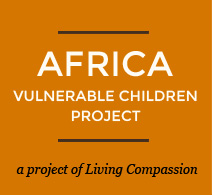After many days of not making our journey to Kantolomba in the marginally cooler hours of the morning, it has finally occurred to us to do so. We picked up pots from the potter we now know is named Beatrice (!), knitted hats and booties from Josephine, and 140 napkins.
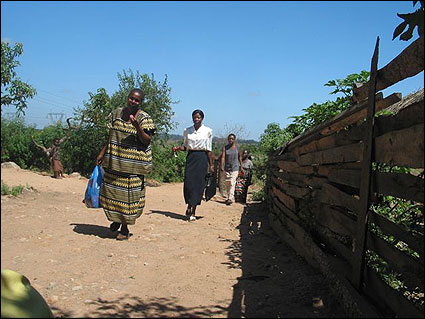
The ladies arriving with their products. Front to back: Georgina, and
Neli with napkins, Josephine with knitted booties and hats and Beatrice with pots.
After going over the electricity plan with Israel, we pulled up rocks and the cutest little meditation bench-esque stools to sit on to conference with the ladies about work: crocheting, sewing (moving the sewing cooperative to Kantolomba), teaching, cooking for and serving the children, cleaning, building (creating a covered area in which to gather and sit out of the sun; finishing the fences around the property), and garbage collection.
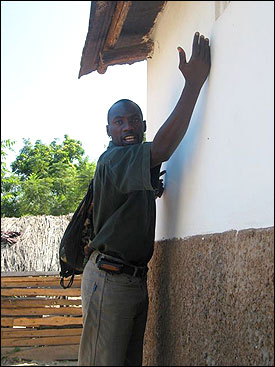
Israel looking at the job.

Meeting with the team.
We are trying to set up a system that will be fair and equitable for all. Some women clean up garbage, others knit and sew, and all will be paid the same amount. It occurred to us as we were laying this out that we must, as a group, come up with some sort of business for these women to own and operate. They are so bright and talented and clever--at one point they were doing math in English, and they barely speak English! Here's another one for the amazing department: As we sat there discussing the installation of the temporary electric hook-up, Beatrice told us, through Theresa as translator, that her daughter has graduated from electrician's school. We would never have thought to ask about that! Alas, she has just had a baby, but no doubt by the time we're ready to wire the building she'll be ready to do the job.
On the other side of the kitchen building the well began spewing clean water and the well diggers started packing up to go.
We piled into the car for the trek back to the Savoy and our meeting with Godfrey and his mother, Tina. What an amazing woman. Of course Godfrey is an extraordinary young man, and we can see where he gets it.
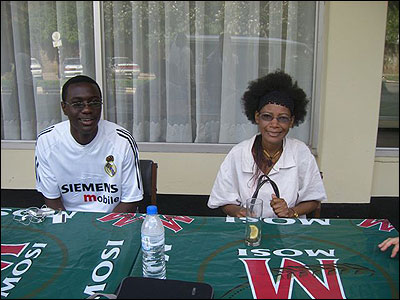
Godfrey and Tina
Tina and her husband, Godfrey, Sr., do AIDS awareness for a large church organization. She gave us a helpful and illuminating overview of the history and current state of HIV/AIDS in Zambia. She said they are still playing catch-up as a result of getting such a late start in dealing with the virus. People were in denial, it was identified as a "sinner's disease," with so much stigma attached that it kept people from admitting the illness even to their closest loved ones or their minister. Even now people don't want to confront any of the aspects of the pandemic: sexuality, gender issues, or sexual abuse.
The church doesn't want to confront any of this. They don't want to talk about it, and
Tina is feeling hemmed in by their ignorance and resistance. The church only wants to help their own members but not with honesty or accurate information, just by offering care in the form of food and supplies to the ill.
The official government estimate is that 54% of the female population of Zambia is HIV positive. Apparently, the stories we've heard are true about witch doctors telling men dying of AIDS that having sex with a virgin will cure them. The girls may be as young as a year or two. Adding to this tragedy is the lack of education for women in Zambia. They are expected to marry, education costs money, and few receive more than rudimentary schooling. A huge percentage of young girls (probably almost all) are sexually abused by relatives or close family friends. The abusers are more than likely HIV+. Because all of this is secret, the girl doesn't tell, and she grows up not knowing she's positive unless she gets sick. She meets a boy, they marry, and a couple of years later they're both dead.
We later asked Theresa if she had heard of this, and she told us more horror stories. All of what's going on is against the law; the challenge is to get the women to prosecute. We heard one story of a man who raped his 12-year-old daughter, and though many organizations, government and non-government, tried to get the mother to press charges, she refused saying she did not want to lose her marriage.
Tina made many points about what she referred to as the "what I need now" syndrome. She told of people who, when they learned they could get food and blankets if they were HIV+, set out to get tested positive so they could get the supplies. They saw no reason not to be positive. They don't feel sick, and they do get food and goodies. "Would I rather die of hunger or die of AIDS?" "I'd rather die of AIDS. That's tomorrow. I need to eat today."
Tina wants to open a center that will provide education, referrals, counseling, and support. The local District Health Management Team is encouraging her in her vision, but they are unable to help financially.
After meeting with Tina we went back to the guesthouse for a quick lunch. Theresa and Dave then set off to meet Israel to buy the electrical supplies in town, find a cover for the well, pick up Brian (internet), and go back out to Kantolomba.
We have learned that there is no such thing as a quick and easy trip to town, and this was no exception. The electrical parts (wire, lights, fittings, a breaker-box, a meter, and other things) were shockingly expensive. The prices were as high or higher than we would find in the U.S. After extensive negotiations with the shop owner--a sharp Zambian woman, it turned out, which is a great rarity here (most of the businesses are owned by Indians) and a pleasure for us--we agreed upon a final price for our pile of goods, handed over a four-inch stack of Zambian kwatcha, and headed for the hardware store.
We spent an hour trying to find something (a simple plastic bucket) to use to cover our new well hole, then headed to the "industrial area" to pick up Brian. Brian is another on the long list of people we have met here who have somehow, through their intelligence and determination, managed to provide themselves with first-world education and know-how here in one of the poorest places on Earth. Brian's passion, it turns out, is banking and micro-finance, but he makes his living setting up complex information systems.
Once in Kantalomba, Brian brought out his equipment to test for a wireless signal, and found nothing. He and Dave then hiked to the top of the ridge that stands over the compound to see what was going on. The view from the "mountain," as the locals call it, is breathtaking. It is the second highest place within a hundred miles. From there we could see all the way to downtown Ndola, and could pick out all of the internet towers and repeaters in the area. Unfortunately, they are all on the wrong side of the hill. We need a "line-of-sight" connection to one of those towers, and we just don't have it. "I'm afraid you're out of luck," said Brian.
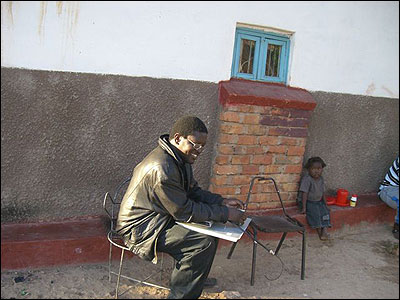
Brian with his gismos.
It is possible to get a satellite connection, but this is expensive and the speed would be slow. We need to regroup around this issue, obviously, with the help of some good research once we return home, so that we can make a good decision about how to proceed.
Our last task before we returned to town was to cover the well. We put the bucket we had bought over the top and then, with the help of a dozen children who happened to be there, piled stones on top to create a barrier to curiosity and temptation. Once this was finished, Dave, Theresa, and Brian loaded up and headed home.
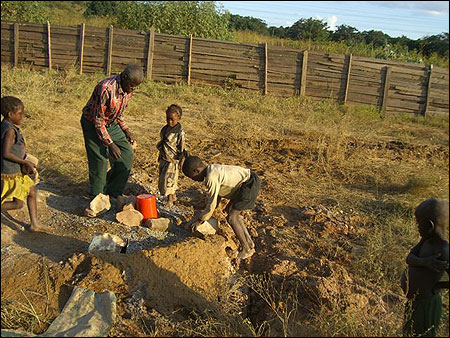
Piling rocks on the well cover (a red bucket).
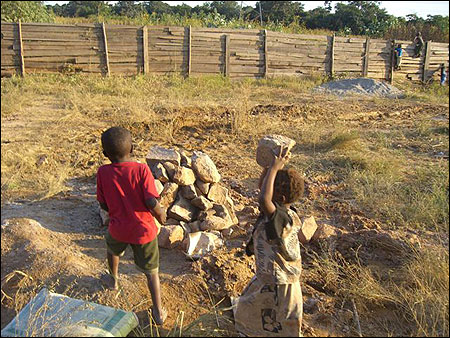
Almost complete.
While the electricity/internet was going on, Jen and Cheri were doing pedestrian errands--back to the lawyer's office to withdraw the bid on the house, to the bank for kwacha, to the hospital to pay for the water test, and to the craft market for a few items to bring back to try out at Keep It Simple. As we were doing our negotiating, we heard a voice calling, "Cheri!" and turned to see Douglas, our old friend from St. Joseph's Guest House. It was great to catch up with him. According to him, we may yet have a chance of staying at St. Joseph's in July.
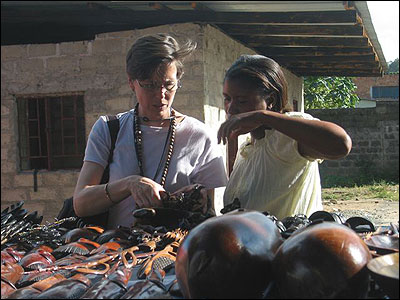
Jen in serious negotiations with the craft ladies.
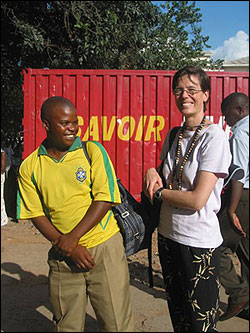
Douglas and Jen
Tomorrow is wrap up. It's hard to believe another trip is nearly over. And what a trip it's been! All our months of preparation are finally coming together in things that show and have a real impact.
